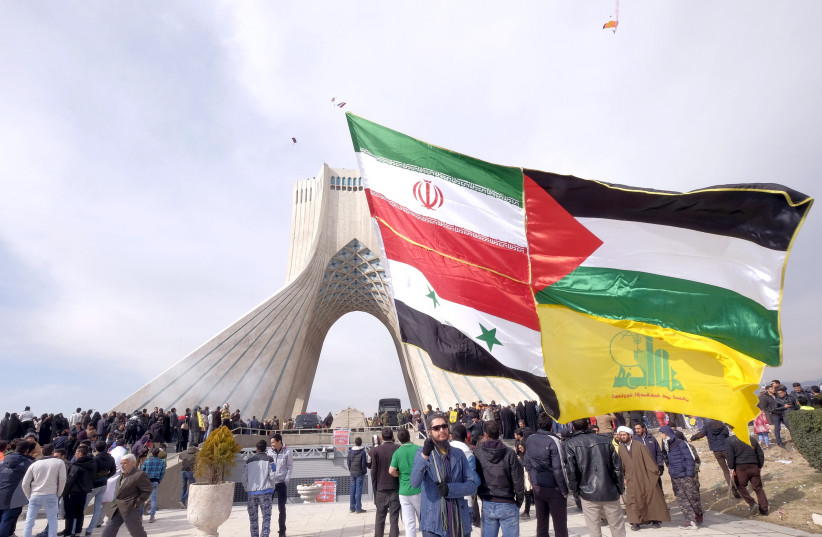If a Gaza ceasefire deal is reached the entire Middle East “Axis of Resistance” would stop its attacks on Israel, Hezbollah chief Hassan Nasrallah said in a televised address on Wednesday as CIA Director William Burns held talks in Doha to reach such an agreement.
“If there is a ceasefire in Gaza then our front will also cease fire without discussion, irrespective of any other agreement or mechanisms or negotiations,” Nasrallah said on Wednesday.
“Hamas is negotiating on its own behalf and on behalf of the Palestinian factions, and also on behalf of the entire Axis of Resistance. What Hamas accepts, we all accept,” Nasrallah said.
The Axis of Resistance is an alliance built up over years of Iranian support against Israel and US influence in the Middle East. It includes Yemen’s Houthis and Shi’ite armed groups in Iraq.
Since the Hamas-led invasion of October 7, Israel has battled Hamas in Gaza, alongside Hezbollah on its northern border as well as attacks from the Shi’ite armed groups in Iraq and the Houthis in Yemen.

Meetings with Netanyahu and Gallant in Israel
In Israel, White House Coordinator for the Middle East and North Africa Brett McGurk met with Prime Minister Benjamin Netanyahu and Defense Minister Yoav Gallant as well as with National Unity Party head Benny Gantz.
Gallant discussed with McGurk one of the stumbling blocks to the deal, which is the issue of the critical buffer zone between Gaza and Egypt, known as the Philadelphi Corridor.
Hamas had smuggled weapons into Gaza for use against Israel through tunnels it had dug under that corridor.
An IDF withdrawal from the corridor and indeed from all of Gaza has been one of the group’s demands for a hostage and ceasefire deal.
Gallant told McGurk that “A solution is required that will stop smuggling attempts and will cut off potential arms supply to Hamas, and will enable the withdrawal of IDF troops from the corridor, as part of a framework for the release of hostages.”
Israel supports the reopening of the crossing between Egypt and Gaza, Gallant said, but stressed that Hamas cannot return to that area.
Egypt so far has refused to reopen that crossing as long as Israel controls it on the Gaza side, as it does now.
Gallant thanked McGurk for his efforts to secure a deal.
Later, at the National Defense College, Gallant said that “a limited window of opportunity had opened up that would allow us to fulfill our moral and ethical duty – to return the hostages.
“The conditions that will be created as a result of the deal will promote our national and security interests,” Gallant said.
He stressed that the IDF could defend the country against any risks that might arise as a result of the deal.
The meetings Burns and McGurk held Wednesday were part of an intense push by the United States to secure an agreement to the three-phase deal US President Joe Biden unveiled on May 31. They are working to put it in place together with the mediating countries of Egypt and Qatar, both of which hosted hostage talks this week.
Hamas initially rejected the agreement, holding fast to its principled position that it would not agree to any deal that did not include a pledge from Israel to end the war and withdraw the IDF from Gaza.
Israel has insisted that any deal must ensure the release of hostages as well as the removal of Hamas from military control and political governance in Gaza. It does not want to commit to a ceasefire until that goal is achieved.
Talks resumed last weekend after Hamas dropped its immediate ceasefire demand, but it has attempted to reinsert it in other ways into the framework agreement.
Netanyahu, earlier this week, published five red lines, including his commitment to a deal that fell within the framework of a Biden proposal.
He listed those conditions, which included prevention of weapons smuggling into Gaza from Egypt, preventing armed terrorists from returning to northern Gaza, maximizing the release of living hostages, and a commitment to fulfilling Israel’s war goals.
Netanyahu emphasized those red lines in his meeting with McGurk, explaining that Israel was committed to the Biden proposal as long as it allowed for those principled points, the Prime Minister’s Office said.
Reuters contributed to this report.
